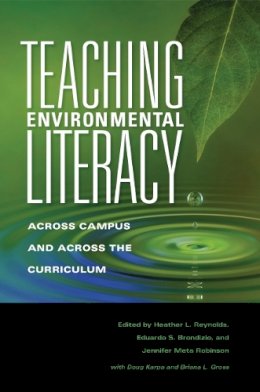Heather L. Reynolds is Associate Professor of Biology at Indiana University Bloomington. Eduardo S. Brondizio is Professor of Anthropology at Indiana University Bloomington. Jennifer Meta Robinson is Senior Lecturer in the Department of Communication and Culture at Indiana University Bloomington and former Director of Campus Instructional Consulting. She is author (with J. A. Hartenfeld) of The Farmers' Market Book: Growing Food, Cultivating Community (IUP, 2007).
"As the title indicates, this book advocates teaching environmental education at the university level. Taking it a step further, the editors and chapter contributors recommend requiring not just environmental appreciation courses but also adjustments to general curricula that would incorporate environmental education into all classes. This work provides a justification for adjusting curricula across the board. Contributors suggest content for inclusion and useful strategies for engaging students in learning about the environment as well as in the environment. Most chapters are accompanied by bibliographies, which offer support for this significant adjustment to college education campus wide and nationwide. The authors also discuss current successful programs at universities across the US that could function as models for change elsewhere. This book serves as an excellent, literature-based guide for adapting current curricula to educate college students about their disciplines of interest using the environment as a context. Summing Up: Highly recommended. Graduate students and above. — Choice"—D. L. King, University of Georgia, August 2010 "What makes Teaching Environmental Literacy noteworthy is its coherence and accessibility. . . . Providing useful overviews of topics such as ecosystem services, population, and sense of place, the authors focus on specific disciplines as well as cross-disciplinary topics. While not designed as a how-to guide, Teaching Environmental Literacy would serve well any institution seeking to implement revisions to the curriculum—or individuals looking to create or revise courses that foreground environmental literacy. T"—Interdisciplinary Studies in Literature and Environment "This collection is an invaluable resource for developing integrated, campus-wide programs to prepare students to think critically about, and to work to create, a sustainable society. 2010"—Abstracts of Public Administration, Development, and Environment "Anyone reading this book will walk away with ideas for how to address the most critical issue of the 21st century in his or her classroom. For that reason, I recommend this book for a much larger audience than college and university faculty. Even educators who work with our youngest children will find fodder in this book for self-reflection about what, why, and how to teach. I recommend it for teachers of all stripes who work to promote a sustainable future for our children.July 2011"—National Science Teachers Association "[This] book is well written, engaging, thought provoking, and refreshingly free of errors. A particularly detailed and effective index is provided, as is an appendix. The volume is both inspirational and functional. August 2011, Vol. 61 No. 8"—BioScience "Teaching Environmental Literacy would serve well any institution seeking to implement revisions to the curriculum- or individuals looking to create or revise courses that foreground environmental literacy. October 19, 2011"—Annie Merrill Ingram, Davidson College "Even as interconnected environmental, social, and economic problems have become increasingly prominent in public discourse, the training people receive to understand and address such concerns has lagged behind. Thirty-odd years after the first Earth Day, for example, only one-third of Americans can pass basic tests of environmental knowledge with grades of C or better . . . ."—from the introduction

